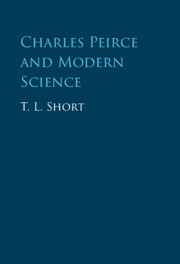Book contents
- Charles Peirce and Modern Science
- Charles Peirce and Modern Science
- Copyright page
- Dedication
- Contents
- Preface
- Acknowledgments
- A Note on Citation of Sources
- Chapter 1 Peirce’s Life in Science: 1859–1891
- Chapter 2 Peirce’s Concept of Science
- Chapter 3 Modern Science Contra Classical Philosophy
- Chapter 4 The Meaning of Pragmatism
- Chapter 5 Misleading Appearances of System
- Chapter 6 Devolution of the Cosmogonic Program
- Chapter 7 Experiments Expanding Empiricism
- Chapter 8 Phaneroscopy and Realism
- Chapter 9 Normative Science
- Chapter 10 Modern Science Contra Modernity
- Bibliography
- Index
Chapter 7 - Experiments Expanding Empiricism
Published online by Cambridge University Press: 26 October 2022
- Charles Peirce and Modern Science
- Charles Peirce and Modern Science
- Copyright page
- Dedication
- Contents
- Preface
- Acknowledgments
- A Note on Citation of Sources
- Chapter 1 Peirce’s Life in Science: 1859–1891
- Chapter 2 Peirce’s Concept of Science
- Chapter 3 Modern Science Contra Classical Philosophy
- Chapter 4 The Meaning of Pragmatism
- Chapter 5 Misleading Appearances of System
- Chapter 6 Devolution of the Cosmogonic Program
- Chapter 7 Experiments Expanding Empiricism
- Chapter 8 Phaneroscopy and Realism
- Chapter 9 Normative Science
- Chapter 10 Modern Science Contra Modernity
- Bibliography
- Index
Summary
The contributions of Peirce’s scientific work to his philosophy have not heretofore been noticed. His psychological experiments extended the realm of admitted observation: by making putative observations, finding that they agree and that their agreement can be explained by what is putatively observed, what was putative is verified. There is no empirical knowledge without metaphysical but fallible presuppositions; they can only be confirmed by the success of the observations they permit. Peirce expanded empiricism in two directions, both surprising. His astronomical work, ranking stars by order of magnitude, required careful attention to one’s own sensations: interpersonal agreement in that ranking suggested the possibility of phenomenology. And the impressionistic ranking of stars’ magnitudes became the model for Peirce’s idea of normative science. The seemingly oddest of his studies, the ’Great Men Study’, provided evidence that normative impressions, as they agree, are observations. It remained only to make the presumed metaphysics intelligible.
Keywords
- Type
- Chapter
- Information
- Charles Peirce and Modern Science , pp. 157 - 179Publisher: Cambridge University PressPrint publication year: 2022

